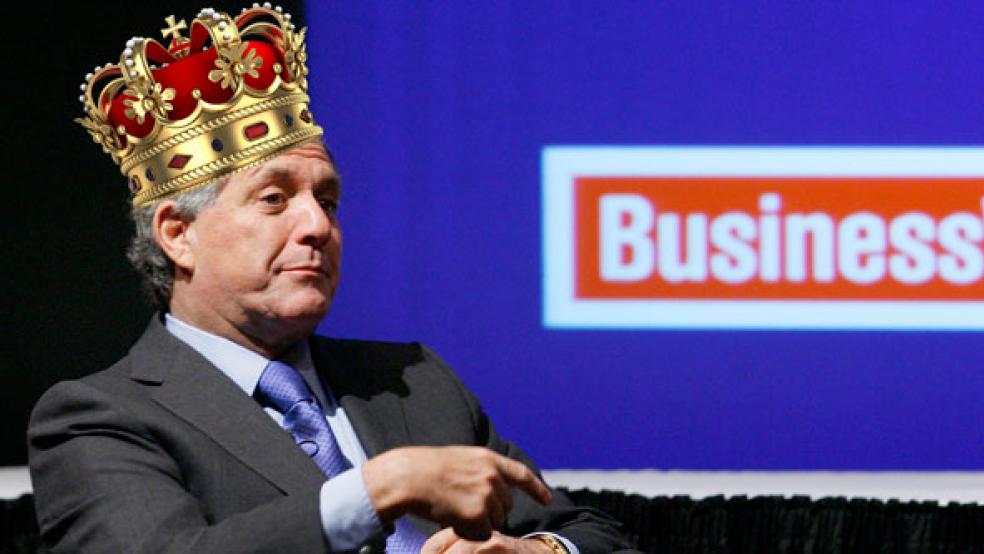CBS Corp. flexed its muscle once again the other day when it reported record fourth-quarter earnings for 2012.
It’s the kind of performance that has established CBS as a model company at a time of chaos and challenges for the media industry. Cable stations have become major players, eroding the dominance of the networks. The Internet has forced every entity to re-design its strategy to attract eyeballs. For the "old-media," a devastating slowdown in advertising revenue across the board has forever damaged the newspaper and magazine industries.
RELATED: 6 Apps That Will Transform Television in 2013
And yet CBS remains a model of consistency. Under CEO Leslie Moonves, it has become – as it reminds us frequently – America's Most Watched Television Network. Along the way, CBS has transformed its image from the network famous for reaching the "Murder She Wrote" demographic to the one that brings us the powerful, Madison Avenue-friendly "CSI" and "NCIS" franchises. And on the cable side, CBS's Showtime channel now boasts arguably the most talked-about and acclaimed drama on the tube, "Homeland."
Those successes have propelled the stock 51 percent higher over the last year and they shone through again in the fourth-quarter earnings report. Adjusted net earnings from continuing operations came to $414 million for the fourth quarter of last year, or 64 cents for each diluted share, up from $377 million, or 56 cents a share, for the year-ago quarter. Revenue of $3.7 billion for the quarter rose 2 percent from $3.6 billion in the same year-before period. The growth was spurred by a 3 percent jump in advertising revenue, reflecting resurgent political and network advertising. Affiliate subscription fee revenue gained 9 percent, powered by growth at CBS-owned cable networks and robust retransmission revenue from CBS Network-affiliated TV stations.
Yes, skeptics will argue that CBS failed to meet Wall Street's projections by a few pennies in the quarter, but you could also make a case that the Street expects too much at times from steady performers such as CBS.
The business media's easy explanation for the wide optimism surrounding CBS centered on lower interest expense resulting from CBS's 2012 debt refinancing, as well as lower weighted average shares outstanding stemming from its continuing share repurchase program. But the sharper explanation would be to attribute the nifty earnings report to the strategy implemented many years ago by Moonves. Put simply, Moonves has emerged as the kind of CEO who converts defeats into victories, the hallmark of a strong and dependable leader.
He could be called the father of reality television with his bold decision to introduce "Survivor" in 2000. That act went a long way toward changing CBS's image. Plus, such durable comedies as "Two and a Half Men," "How I Met Your Mother" and "The Big Bang Theory" – though not critical darlings – give CBS a clear identity on Monday evenings, even during the football season.
Take the saga of the runaway hit "Two and a Half Men" as a perfect example of Moonves' cool, measured problem-solving ability. Remember when Charlie Sheen, then the star of CBS's runaway hit sitcom, melted down in public and left the show in an uproar?
I sure do – but my takeaway from that sorry episode had nothing to do with the vicissitudes of celebrity in Hollywood or the unlikely benefits of drinking tiger blood. I learned a much more valuable lesson, namely that strong, reliable management will trump any short-term problem that Sheen could cook up.
I recall that a media-industry securities analyst said this crisis would pass and CBS would ultimately be stronger than ever in Wall Street's eyes. “How could that be?” I yelped, looking at the messy circumstances of the star's exit and the predicament of replacing him.
The analyst smiled at my naiveté and declared: "Les will figure it out,” referring to Moonves. The implication was that the investment community believed that Moonves would find a way to solve the thorny problem. Fast forward to today: "Two and a Half Men" is doing just fine, and Charlie Sheen has become something of an afterthought.
The point is that where Main Street saw a problem, Moonves recognized an opportunity. He re-tooled, replacing Sheen with Ashton Kutcher, and salvaged a ratings winner.
Moonves' leadership has CBS well-positioned, as the earnings report showed, but he’s not afraid to make changes either. The company announced last month that it would spin off its outdoor ad business in the U.S. as part of an effort to focus on its core properties. The move, Moonves said last week, helped the company increase its share buyback program by $1 billion.
"CBS had a record year in 2012, as well as a record fourth quarter, and the momentum is building for an even better 2013," said Moonves. “We feel very good about our future, and we are very encouraged by the strength of our core businesses and the increasing premium we are able to command for our content."
But now comes the hard part for CBS: keeping the momentum going, quarter after quarter. Wall Street is an ever-demanding master. It is never quite satisfied and it has a notoriously short attention span. Moonves has the burden of keeping investors happy. It won't be easy.






